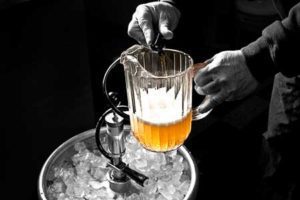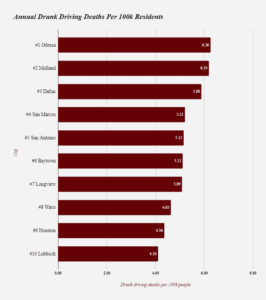 Texas is ranked number one when it comes to alcohol-impaired driving fatalities. In 2018, there were 940 people killed in car accidents when a driver was under the influence of alcohol. Most drunk driving accidents occur on a Saturday between 2:00 am and 3:00 am. Driving under the influence holds harsh consequences and getting in an accident can worsen and lead to criminal penalties. Last year Sutliff & Stout compiled a list of Texas cities with the highest drunk driving fatalities.
Texas is ranked number one when it comes to alcohol-impaired driving fatalities. In 2018, there were 940 people killed in car accidents when a driver was under the influence of alcohol. Most drunk driving accidents occur on a Saturday between 2:00 am and 3:00 am. Driving under the influence holds harsh consequences and getting in an accident can worsen and lead to criminal penalties. Last year Sutliff & Stout compiled a list of Texas cities with the highest drunk driving fatalities.
What is Considered Driving under the Influence?
Across all states driving with a blood alcohol content (BAC) of 0.08 is considered driving under the influence for drivers who are 21 years or older. The legal limit for drunk commercial drivers is a BAC of 0.04 or greater. A commercial driver in Texas may drive a large truck, 18-wheeler, big rig, or even a school bus. For drivers under the age of 21, any trace of alcohol is illegal.
Reaching these alcohol levels can vary based on genetics, weight, gender, and overall consumption. Drinking alcohol can cause erratic behavior or delay a driver’s reaction time.
We want to help you too.
Submit the short form below to get a free case review.
What Makes Drunk Driving Accidents Different from Normal Car Accidents?
Many aspects of drunk driving accidents are similar to those of other automobile accidents. In either scenario, there is the possibility of catastrophic injuries or death, as well as the process of assigning liability and negotiating with insurance providers to reach a settlement. However, a drunk driving accident is distinct from other accidents in two key ways.
First, it is not necessary to prove negligence. In other words, someone who is intoxicated and gets behind the wheel is breaking the law. This is called negligence per se. Therefore, a person injured in a drunk driving accident does not need to prove the first two elements of negligence, namely the duty of care and breach of duty. Instead, a plaintiff must solely show that the defendant’s actions caused harm that resulted in losses.
In addition, an individual who is injured in a drunk driving accident may receive punitive damages compared to an accident where there is no evidence of alcohol involvement.
The purpose of punitive damages is to penalize the at-fault party and to discourage others from acting in the same manner. Punitive damages are available only if the defendant acted with malicious intent or gross negligence. Usually, driving while intoxicated amounts to gross negligence.
How to Prove Drinking and Driving?
If you have been in a car accident or injured by a drunk driver you can file a personal injury claim against the driver or other parties involved. If the driver was served in an obviously intoxicated state, you also have a right to sue the establishment that served the drunk driver and such bar may held liable for your damages.
 Personal injury cases that involve a drunk driver can be long and extensive. It is crucial to prove liability when hit by a drunk driver. A police report stating that the driver was legally intoxicated and/or had an open alcoholic beverage in the car at the time of the accident is the best evidence for negotiating a higher settlement or to use at a trial in a personal injury case. Signs that a driver may have been drinking or using marijuana are:
Personal injury cases that involve a drunk driver can be long and extensive. It is crucial to prove liability when hit by a drunk driver. A police report stating that the driver was legally intoxicated and/or had an open alcoholic beverage in the car at the time of the accident is the best evidence for negotiating a higher settlement or to use at a trial in a personal injury case. Signs that a driver may have been drinking or using marijuana are:
- The use of breath spray;
- Driver starts chewing gum or takes a breath mint;
- Driver uses eye drops;
- Driver tries to use the bathroom;
- The driver tries to say another person in the car was the driver (pay attention to who was driving the vehicle at the time of the accident); or
- The driver tries to get rid of trash in the vehicle (driver may attempt to get rid of open alcoholic beverage containers or drugs before the police arrive).
A drunk driver may attempt to do a number of things before a police officer arrives on the scene in order to cover up the fact that they are intoxicated, so it is important to pay attention to the actions of the driver after an accident and report any suspicious activity by the driver or suspicion of drinking and driving to the responding police officer.
When approaching the other driver after an accident pay attention to the possible smell of alcohol or marijuana, watch for the use of breath or body spray, use of eye drops, chewing of gum or breath mints, driver wanting or using the bathroom, throwing stuff away from car, and who was actually driving the vehicle. Make sure to obtain a copy of the police report to show that the driver was intoxicated, or had open alcoholic bottles in the car at the time of the accident to use during settlement negotiations or at a trial.
Also, a driver’s conviction for driving while intoxicated (DWI) or driving under the influence (DUI) can be used in a personal injury settlement negotiation if one has not been reached yet. Under Texas statute, a person commits a DWI if driving with a blood alcohol level (BAL) of .08 or higher. Under Texas statute, a DUI involves minors driving with any detectable amount of alcohol in their system.
Using Evidence of Drinking and Driving During Negotiations or at Trial
 Providing a police report to the insurance company during a settlement negotiation can provide substantial leverage for negotiating a higher settlement. If the police report establishes that the other driver was legally intoxicated at the time of the accident and/or had an open alcoholic beverage container in the vehicle an insurance claims adjuster will factor in how this will look to a jury and the possible jury award that may be issued if the case does not settle and instead goes to trial. If a reasonable settlement cannot be reached and the case goes to trial the police report, police officer’s testimony, as well as, your own testimony can be used to establish that the other driver was under the influence.
Providing a police report to the insurance company during a settlement negotiation can provide substantial leverage for negotiating a higher settlement. If the police report establishes that the other driver was legally intoxicated at the time of the accident and/or had an open alcoholic beverage container in the vehicle an insurance claims adjuster will factor in how this will look to a jury and the possible jury award that may be issued if the case does not settle and instead goes to trial. If a reasonable settlement cannot be reached and the case goes to trial the police report, police officer’s testimony, as well as, your own testimony can be used to establish that the other driver was under the influence.
What are Dram Shop Laws?
Others may also be held liable for your injuries in a personal injury case involving a drunk driver. Under Texas statute, a bartender or another person who serves, sells, or provides alcohol to a person when it is apparent that the person is intoxicated to the extent that the person presents a clear danger to themselves and others and the intoxication of the person was the proximate cause of the damages caused then the bartender or other person providing, serving, or selling the alcohol may be held liable. In Texas, however, the bartender may be shielded from liability under safe harbor laws if:
- The employee is required to attend a commission-approved seller training program;
- The employee actually attended the training program; and
- The employer did not directly or indirectly encouraged the employee to violate laws related to the selling and serving of alcoholic beverages.
If your accident involved a minor driving under the influence the person who provided the minor with alcohol may also be liable for your injuries. Under Texas statute an adult can be held liable for an accident caused by a minor if the adult was not the minor’s legal guardian, parent, or spouse and the adult knowingly provided or served the minor alcohol that contributed to the minor’s intoxication, or allowed the minor to be served or provided alcohol that contributed to the minor’s intoxication on the premise owned or leased by the adult.
Injuries Common in Drunk Driving Accidents
Like other types of accidents, multiple interrelated factors will affect the degree and nature of injuries sustained in a drunk driving accident. A vehicle’s speed, the type of vehicle involved in the crash, existing health, body position, and whether occupants were wearing seatbelts can all affect the severity of injuries. Below are some of the most common injuries sustained in an accident caused by a drunk driver:
- Whiplash
- Concussion
- Spinal cord injuries
- Neck, head, and back injuries
- Strains, sprains, or fractures
- Burns and lacerations
- Traumatic brain injuries
- Internal injuries
When you’ve been hurt in a car accident caused by a drunk driver, you should make an immediate trip to your nearest emergency room to have your injuries checked out. Sometimes, car crashes don’t cause immediate or noticeable injuries, which is why receiving a thorough medical evaluation is integral to your health and that of anyone else involved.
By seeking medical care immediately following a drunk driving accident, you’re making a formal record of your injuries, which will also protect your legal rights.
What Damages Can a DUI Accident Victim Recover?
Innocent victims who suffer serious injuries in a car accident are rarely comforted by the prospect that a drunk driver will face criminal charges. Though a criminal record can penalize an offender and keep them off the roads, it will do nothing to compensate the victims.
The only means of redress for those who have suffered injuries in an accident is often filing a personal injury lawsuit. Victims can sue for compensation for damages such as:
- A big part of injury compensation comprises lost wages. This compensation may cover wages lost while off work as well as medical bills for the time taken off to receive treatment. People who are permanently impaired and cannot return to work because of their injuries can be compensated with the wages that would have been made if they were not injured. This compensation is referred to as lost earning capacity.
- Medical care can be extremely expensive. People who are injured by an impaired driver can file for compensation to pay for their medical expenses, both present and future. This can cover costs for emergency medical care, surgery, treatment, medical equipment, rehabilitation, and long-term care. A person’s lifetime medical care needs are considered when calculating damages.
- Individuals who have suffered significant emotional distress as a result of an accident often seek compensation for pain and suffering. The mental representation of pain and suffering focuses on the issues that arise out of being injured, such as emotional distress, depression, fear, anger, humiliation, anxiety, and shock.
While these types of damages are often sought when an accident involves a drunk driver, you may be entitled to other forms of damages as well. The advice of a personal injury attorney is essential for anyone injured or killed in a DUI car crash.
If you or a loved one has been wronged in a drunk driving incident, Sutliff & Stout will fight to make things right for you. Get a free consultation today and find out how we can help you receive the compensation you deserve.
Can I File a Wrongful Death Claim Against a Drunk Driver?
If you have a family member that was killed in an accident involving a drunk driver you may have a wrongful death suit against the drunk driver. In Texas, if the person killed in the accident would have been able to bring a civil suit against the drunk driver if that person had lived then the family of the deceased driver may bring a wrongful death suit against the drunk driver. A wrongful death suit against a drunk driver may cover funeral expenses, medical bills, loss of future earning capacity, loss of consortium, and other damages. A wrongful death suit may be brought up to two years from the date of the accident.
An accident involving a drunk driver can be horrific, however, establishing that the driver was under the influence of drugs or alcohol can lead to a higher settlement or personal injury award for damages. Others may also be held liable for providing, serving, or selling alcohol to the person that caused the accident.
How to Report a Drunk Driver?
Sometimes, it can be difficult to distinguish a drunk driver from an unsafe or reckless driver. When driving, walking, or riding near the street, especially at night, you should be aware of those around you to avoid trouble. Watch for swerving, sudden stops, tailgating, speeding, and rapid acceleration and deceleration. Also, keep an eye out for mistakes like using the wrong turning signal, not putting on one’s headlights, or driving on the wrong side of the road.
It is important to protect our roads by not drinking and driving as well as reporting drunk driving. If you see a person driving recklessly it is important to notify the proper authorities. In Texas, an individual can report a drunk driver by calling 1-800-525-5555. This number can be found on the back of your driver’s license. In the event you witness a major collision or an emergency situation call 9-1-1.
Call an Experienced Drunk Driving Accident Attorney
Any motor vehicle accident should be followed immediately by seeking medical attention. You should prioritize your health before anything else. Texas law maintains strict Statute of Limitations when bringing a personal injury lawsuit, wrongful death lawsuit, or a dram shop lawsuit against a negligent party or parties. The time usually starts counting down when the accident occurs. When help is needed, Sutliff & Stout is ready and willing to advocate for you.
If you or a loved one has been injured by a drunk driver accident, you may have legal recourse. You have too much at stake to handle a complicated drunk driving case on your own. Do not wait to seek advice from an experienced drunk driving accident attorney. For a free case review contact the law office of Sutliff & Stout at (713) 987-7111 or contact us online.





 (713) 405-1263
(713) 405-1263  550 Post Oak Blvd, Suite 530
550 Post Oak Blvd, Suite 530